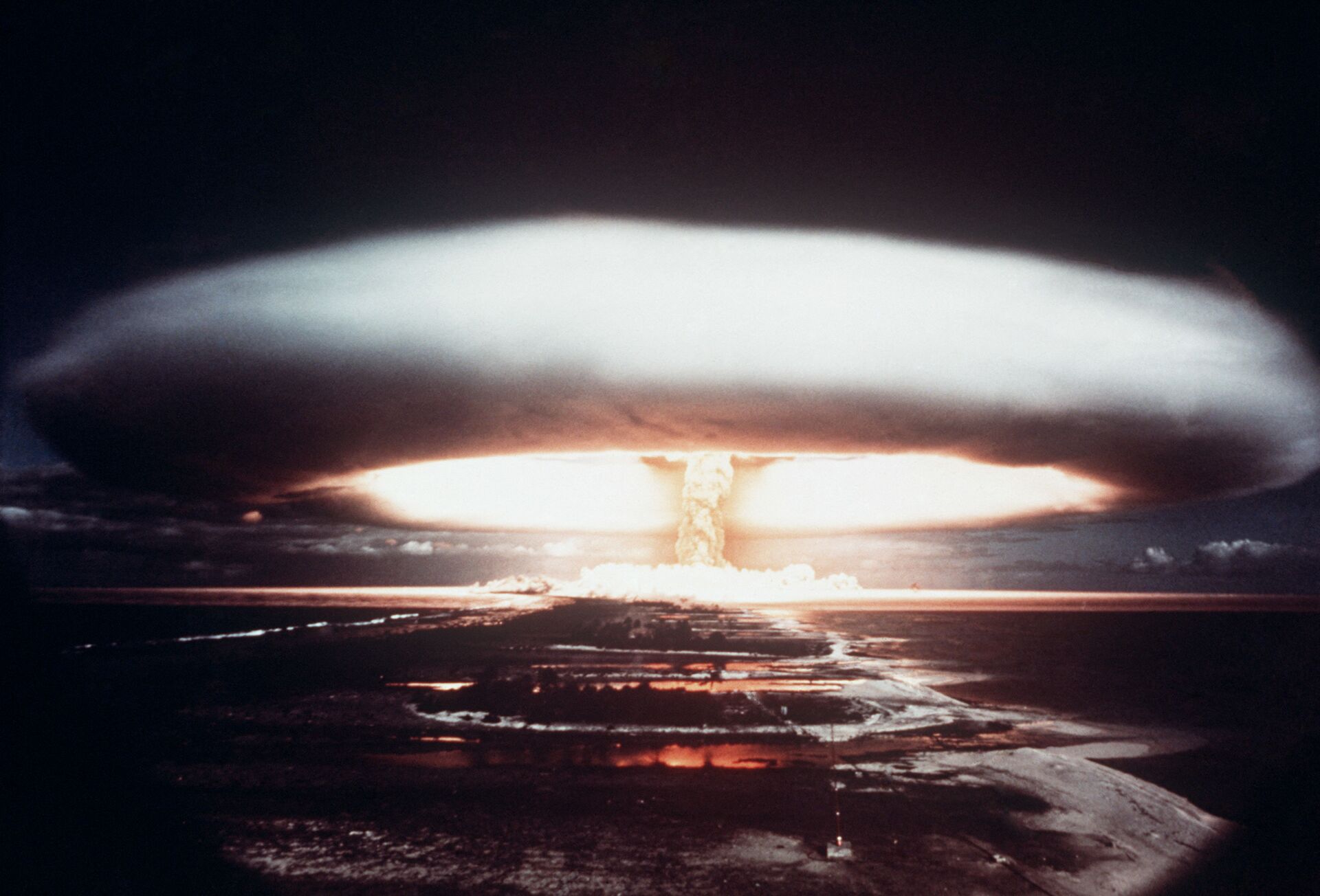Macron Says France Owes French Polynesia 'A Debt' Over Nuclear Tests, Stops Short of Apologising
09:19 GMT 28.07.2021 (Updated: 16:54 GMT 31.07.2023)

© Photo : YouTube / euronews
Subscribe
Emmanuel Macron arrived in French Polynesia on Saturday on a visit meant to demonstrate the French President’s commitment to the region, triggering hopes among residents he would apologize for the legacy of French nuclear testing in the area during the 1960s and 1970s.
French President Emmanuel Macron dashed the hopes of local residents in French Polynesia, failing to offer an official apology for the nuclear tests conducted in the South Pacific territory between 1966 and 1996.
Macron, on his first official visit to the territory, acknowledged on Tuesday that Paris owed "a debt" to the population of the archipelago of more than 100 islands located midway between Mexico and Australia.
"The nation owes a debt to French Polynesia. This debt is from having conducted these tests, in particular those between 1966 and 1974," said Macron in his speech addressed to Polynesian officials, adding that he sought “truth and transparency" on the controversial issue.
"I think it's true that we would not have done the same tests in La Creuse or in Brittany," he said, adding that he was "committed to changing things" regarding compensation.
"I've heard you, and I've heard what you are asking of me, and you will see my response," said Macron.
Deep-Rooted Resentment
The tests conducted from 1966 to 1996 as France developed nuclear weapons have left behind a legacy that remains a source of deep resentment, perceived as evidence of racist colonial attitudes permeated with disregard for the lives of local residents.
Some 193 nuclear tests were conducted by France in the region, including 46 atmospheric blasts, before the programme was shut down. It wasn't until May 2019, however, that the French parliament acknowledged the health consequences of the nuclear testing in the area.
"We're expecting an apology from the president," Auguste Uebe-Carlson, head of the 193 Association of victims of nuclear tests, stated ahead of Macron's visit.
"Just as he has recognised as a crime the colonisation that took place in Algeria, we also expect him to declare that it was criminal and that it is a form of colonisation linked to nuclear power here in the Pacific," said Auguste Uebe-Carlson.
‘True Impact’ of Nuclear Testing
Earlier this year, an investigative website claimed that "French authorities concealed the true impact of nuclear testing on the health of Polynesians for more than 50 years." The website called Disclose announced that it had analysed 2,000 pages of declassified French military documents related to tests conducted around French Polynesia.
The study was jointly carried out by the investigative journalism website and Princeton University, with the research concluding that the impact of the Aldébaran, Encelade, and Centaure tests carried out in 1966, 1971, and 1974, respectively, was much more serious than officially acknowledged.
The conclusions were presented in The Mururoa Files, after researchers reconstructed the three tests and their fallout on the basis of key data from 2,000 pages of declassified French Defence Ministry documents, maps, photos, and other records.
"The Mururoa files", une enquête sur les essais nucléaires français dans le Pacifique.https://t.co/S1Xi0gkCGC
— Xavier Delcourt (@x_delcourt) March 9, 2021
It was determined that the entire population of Tahiti and the Polynesian Leeward Islands - about 110,000 people - was exposed to a radiation dose of more than 1mSv due to the Centaure test.
The study also asserted that the actual radiation doses experienced by the residents of some districts of French Polynesia's capital Papeete were two or three times higher than those recorded in a 2006 study released by France's Atomic Energy Commission (CEA). Only 63 Polynesian civilians have been compensated for radiation exposure since the tests ended in 1996, according to Disclose.
France Denies ‘Cover-Up’
France's National Institute of Health and Medical Research (Inserm) released a report in February, arguing that it "could not conclude with certainty" that there was a link between the tests and the multiple cases of cancer registered in French Polynesia as it underscored the need "to refine dose estimates".
The French government has denied allegations of a cover-up related to the impact of nuclear tests.
"There was no state cover-up," said Genevieve Darrieussecq, a junior defence minister earlier in July, with AFP noting that she also "ruled out any official apology from France."
Emmanuel Macron echoed these sentiments in his remarks on Tuesday to French Polynesia officials.
"I want to tell you clearly that the military who carried them out did not lie to you. They took the same risks... There were no lies, there were risks that weren't calculated, including by the military."




